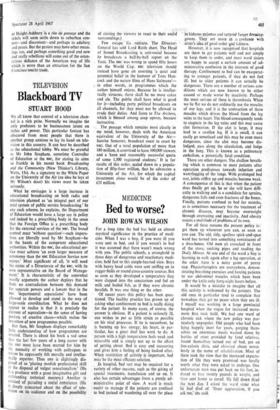Blackboard TV
TELEVISION STUART HOOD
We all know that control of a television chan- nel is a rich prize. Normally we imagine the only predators to be businessmen intent on riches and power. This particular fantasy has obscured from most people that there is another group anxious to lay its hand on tele- vision in this country. It can best be described as the educational lobby. We must be grateful to Mr John Scupham, sometime Controller of Education at the Bac, for stating its aims so frankly in his recent book Broadcasting and the Community (New Thinker's Library, Watts, 15s). As a signatory to the White Paper on the University of the Air (an idea he lays at Mr Wilson's door) his views must be taken seriously.
What he envisages is a large increase in educational broadcasting on both radio and television planned as 'an integral part of our total system of public service broadcasting.' In any such scheme, he explains, the Department of Education would have a large say in policy and indeed be a prescribing body in the sense that the Foreign Office is a prescribing body for the external services of the BBC. The broad control must 'without question'—such impera- tives are liberally used by Mr Scupham—be in the hands of the competent educational authorities. Within the BBC, the educational ser- vice must achieve 'an even larger measure of autonomy than the BBC Education Service now enjoys.' Most significant of all, 'it will need the status of a Directorate of the BBC, with its own representative on the Board of Manage- ment.' It is characteristic of the somewhat woolly arguments the author deploys that he finds no contradiction between this demand for separate powers and a lament that in the BBC 'departmental separatisms' have been allowed to develop and stand in the way of large-scale coordination. What he does not appear to realise is that it is precisely the element of separatism—in the sense of having pockets of creative chaos—which makes the invention of new programmes possible.
But then, Mr Scupham displays remarkably little understanding of how programmes are created. There is about his book a sad sense that the last few years of a long career with the ssc must have been marred for him by Mt. necessity of working with colleagues to "horn he apparently felt morally and intellec- tually superior. Thus one is slightingly dis- posed of as 'placing modish professional skill at the disposal of vulgar sensationalism.' (He is a producer with a great imaginative gift and outstanding technical mastery.) Another is accused of parading a social conscience. (He is deeply concerned about the effect of tele- vision on its audience and on the possibility
of stirring the viewers to react to their social surroundings.)
Few escape his cirisure. The Director- General has sold Lord Reith short. The Head of Sound Broadcasting is anti-social because he broadcasts a ball-by-ball report on the Tests. The BBC was wrong to spend fifty hours on the World Cup. BBC television should instead have gone on asserting 'a quiet and perennial belief in the humour of Tony Han- cock and the nature films of Hans Sielmann'— in other words, in programmes which the author himself enjoys. Because he is intellec- tually virtuous, there shall be no more cakes and ale. The public shall have what is good for it—including party political broadcasts on all channels, for they must not be allowed to evade their duties. And listen to The Archers, which is blessed among soap operas, because instructive.
The passage which remains most clearly in my mind, however, deals with the American equivalent of the University of the Air— Sunrise Semester, broadcast coast to coast by NBC. Out of a total population of more than 180 million, it contrived to have 100,000 viewers and a 'keen and reasonably successful quota of some 1,300 registered students.' It is for results of this order, scaled down to a popula- tion of fifty-four million, that he advocates a University of the Air, for which the capital investment alone would be of the order of £35 million.






































 Previous page
Previous page